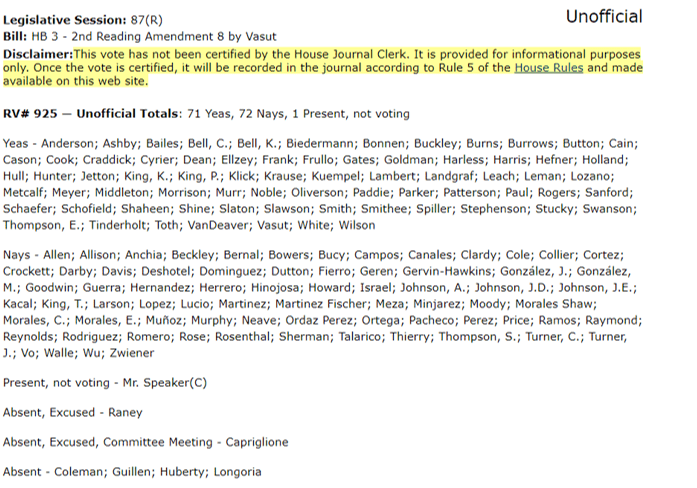On Monday afternoon, the Texas House of Representatives considered the Texas Pandemic Response Act, or House Bill 3, by State Rep. Dustin Burrows (R–Lubbock). After hours of discussion and several amendments, the bill passed its initial reading by a vote of 92 in support and 45 in opposition.
Notably, 72 Republicans of the 83-member Republican Caucus voted in favor of the bill.
It will be considered one final time on Tuesday. Upon final passage, the bill will be sent to the Texas Senate.
Mask Mandate Amendment
Several amendments were offered throughout the debate.
One of the most notable was authored by State Rep. Cody Vasut (R–Angleton). This amendment would have precluded both the governor and local governments from mandating the wearing of masks.
Notably, the amendment was originally successfully added to the bill with no debate, and the House moved on to consider additional amendments. A short time later, Burrows acknowledged his desire to reconsider the amendment, as Democrat lawmakers had complained that it was accepted without their knowledge. Vasut went on to further explain his amendment and was eventually questioned by Democrat lawmakers like State Rep. Rafael Anchia (Dallas) about the merits of such a proposal.
The amendment went up for a vote and was initially passed by a vote of 71 in favor and 70 in opposition. A vote verification was called, and at its conclusion, the amendment had seemingly failed by a vote of 71 in favor and 72 in opposition. It turned out that seven Republican lawmakers had voted with Democrats to allow both the governor and local governments to be able to require the wearing of masks when responding to a pandemic.
Those lawmakers include State Reps. Steve Allison (San Antonio), Travis Clardy (Nacogdoches), Drew Darby (San Angelo), Charlie Geren (Ft. Worth), Kyle Kacal (College Station), Lyle Larson (San Antonio), and Four Price (Amarillo).

Brief History
The bill was filed in late February. Almost immediately, concerned Texans expressed their frustrations with what they argued would only perpetuate disputed authorities of the governor in the wake of the COVID-19 pandemic.
On March 11, a revised committee substitute was first heard in the House State Affairs Committee. It was left pending in that committee until May 4, when an even newer revision of the bill was considered before being voted out of committee unanimously.
What the Bill Does as Amended
In its current form, the bill still perpetuates disputed authorities of the governor by simply not addressing them and instead creates a completely new section of code to address pandemics specifically. The bill now requires the Legislature to be called into session if a pandemic emergency declaration exceeds 120 days. Various amendments were accepted to prevent the closures of places like public beaches or golf courses by any governmental entity.
Additional amendments addressed the Pandemic Legislative Oversight Committee established by one of the earlier revisions to the bill. This committee is now composed of 12 members, including the lieutenant governor; House speaker; and the chairmen of the Senate Finance Committee, Senate State Affairs Committee, Senate Health & Human Services Committee, Senate Education Committee, Senate Jurisprudence Committee, House Appropriation Committee, House State Affairs Committee, House Public Health Committee, House Public Education Committee, and the House Criminal Jurisprudence Committee. An amendment was eventually adopted that allowed for other lawmakers who were not members of this committee to submit a letter requesting their participation in the committee deliberations.
Republican State Rep. Mike Schofield (Katy) offered a few amendments regarding businesses shut down during a pandemic. One of his amendments was adopted onto the bill, clarifying that no governmental entity could force a business to close or limit the operating capacity or use of a business under an order related to a pandemic.
Varying Legislative Approaches
The Texas Senate has already passed out several bills seeking to curtail executive overreach. These include bills like Senate Bill 1025 and Senate Joint Resolution 45 by State Sen. Brian Birdwell (R–Granbury). Both passed the Senate in mid-April and have been sitting in the House State Affairs Committee ever since. Both of these bills attempt to curtail the authorities of the governor by clearly stating that only the Legislature has the authority to suspend or make law in declared times of emergency, while also allowing any current legislator standing to sue the governor in the Supreme Court of Texas at a time of disaster if the governor fails to convene the Legislature in a legislative session after a qualifying disaster or emergency declaration.
The Texas Senate also passed Senate Bill 1616 by State Sen. Paul Bettencourt (R–Houston) last week. SB 1616 seeks to curtail overreach by local governments in times of disaster. Since its passage, it has been sitting in the House Public Health Committee.
The Texas House has thus far been reluctant to bring any bill to the House floor that addresses reforming executive authority, let alone hear them in committees, even though several had been filed. Republican State Rep. Matt Schaefer (Tyler) filed a bill that would have precluded both the governor and local governments from being able to require the wearing of a mask. Schaefer also filed a bill that completely gets rid of any penalty for violating an emergency management plan, including the fine of up to $1,000. State Rep. Steve Toth (R–The Woodlands) filed a bill proposing an amendment to the Texas Constitution that would explicitly state that no order or proclamation issued by the governor may violate or suspend constitutional rights. It also would have required the governor to convene the Legislature in a special legislative session to renew or consider the extension of a disaster declaration after 30 days. Another bill by State Rep. Brooks Landgraf (R–Odessa) would similarly require the governor to call a special session of the Legislature after 60 days of a declared disaster under certain circumstances.
Next Steps
The bill will be heard for a final time tomorrow, May 11. Assuming it passes, it will then be sent to the Texas Senate for its consideration.
Given that there are only about 20 days left in the 87th Legislative Session—and the Senate has already passed several bills related to emergency powers reform, as well as bills addressing specific provisions included in HB 3—it remains to be seen whether the Senate will take up the bill at all.





